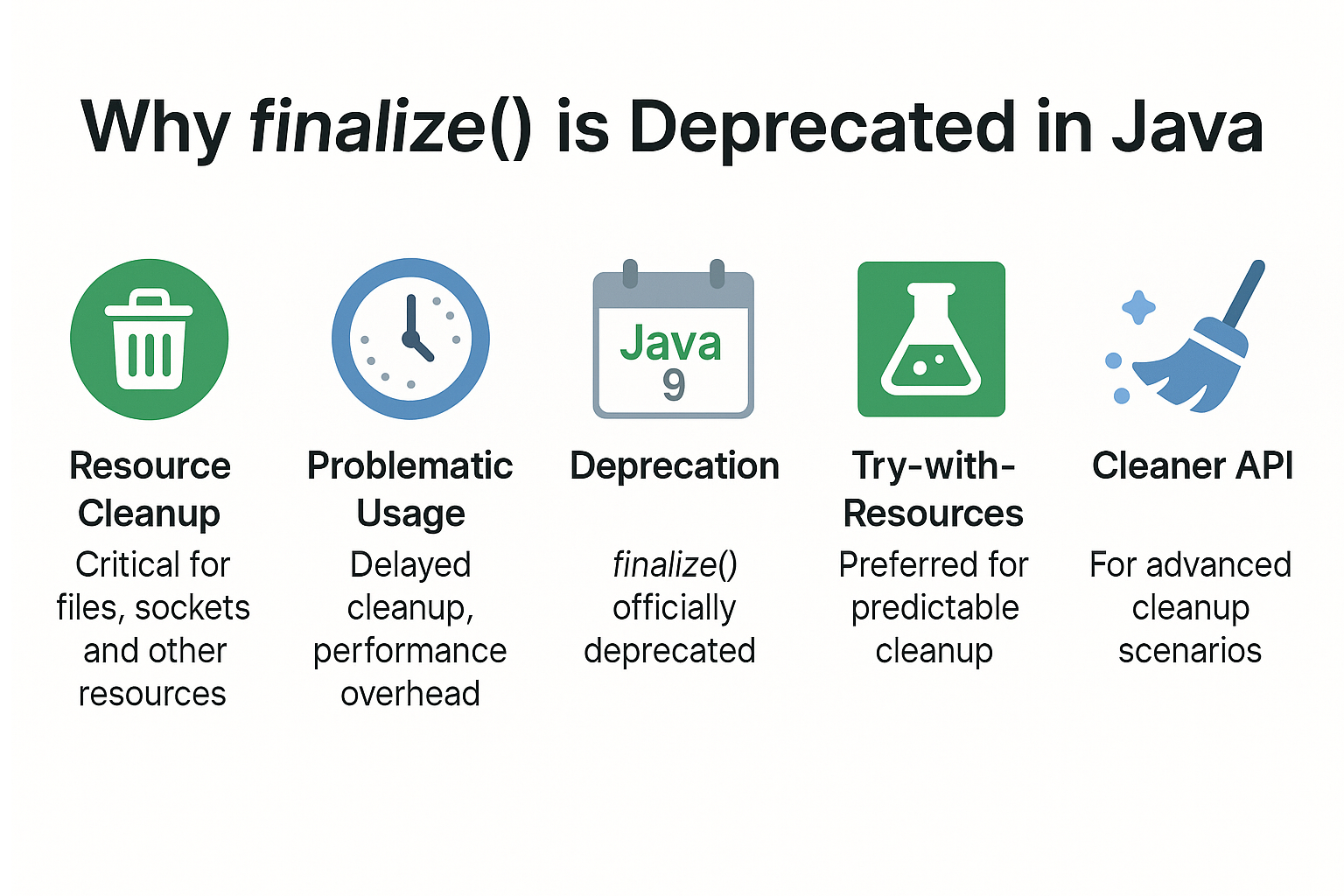For years, Java developers relied on the finalize() method as a way to release system resources before an object was garbage collected. However, over time, finalize() proved problematic, leading to unpredictable performance, memory leaks, and security issues. As a result, the method was deprecated in Java 9 and has been removed in Java 18.
In this tutorial, we’ll examine why finalize() was deprecated, the issues it caused, and the modern alternatives recommended for safe and efficient resource management.
Why Finalization Matters
- Resource cleanup is critical in Java (files, sockets, database connections).
- Misuse of
finalize()led to delayed cleanup and performance issues. - Modern alternatives provide predictable and safe resource management.
Analogy: Using finalize() is like asking a lazy friend to clean up after a party—they might eventually do it, but you have no idea when, and the mess could cause problems in the meantime.
The finalize() Method in Java
The finalize() method was introduced in Java to allow cleanup before an object is garbage collected.
@Override
protected void finalize() throws Throwable {
try {
System.out.println("Cleanup before GC");
} finally {
super.finalize();
}
}
Problems with finalize()
-
Unpredictable Execution
- GC decides when (or if) to call
finalize(). - No guarantee of timely cleanup.
- GC decides when (or if) to call
-
Performance Overhead
- Finalizable objects require extra GC cycles.
- Can significantly delay garbage collection.
-
Security Risks
- Malicious code could resurrect objects inside
finalize().
- Malicious code could resurrect objects inside
-
Memory Leaks
- Delays in cleanup caused resource exhaustion.
Deprecation and Removal Timeline
- Java 9 →
finalize()officially deprecated. - Java 18 →
finalize()removed from the language.
Modern Alternatives to finalize()
1. Try-with-Resources (Preferred)
Introduced in Java 7, try-with-resources ensures deterministic resource cleanup.
import java.io.BufferedReader;
import java.io.FileReader;
import java.io.IOException;
public class TryWithResourcesDemo {
public static void main(String[] args) {
try (BufferedReader reader = new BufferedReader(new FileReader("data.txt"))) {
System.out.println(reader.readLine());
} catch (IOException e) {
e.printStackTrace();
}
}
}
- Automatically closes resources implementing
AutoCloseable. - Predictable and exception-safe.
2. AutoCloseable and Closeable Interfaces
Custom classes can implement AutoCloseable for controlled cleanup.
class Resource implements AutoCloseable {
public void use() {
System.out.println("Using resource");
}
@Override
public void close() {
System.out.println("Resource closed");
}
}
3. Cleaner API (Java 9+)
For advanced cleanup scenarios.
import java.lang.ref.Cleaner;
public class CleanerDemo {
private static final Cleaner cleaner = Cleaner.create();
static class State implements Runnable {
@Override
public void run() {
System.out.println("Cleaner executed");
}
}
public static void main(String[] args) {
CleanerDemo demo = new CleanerDemo();
cleaner.register(demo, new State());
}
}
- Cleaner tasks run after object GC.
- Unlike
finalize(), avoids resurrection and runs safely.
Best Practices for Resource Management
- Prefer try-with-resources for deterministic cleanup.
- Implement AutoCloseable for custom resource classes.
- Use Cleaner API only for advanced scenarios.
- Avoid relying on GC for cleanup.
Pitfalls of Using finalize()
- Non-deterministic cleanup → Causes resource exhaustion.
- Performance degradation → Extra GC passes for finalizable objects.
- Security issues → Object resurrection possible.
- Deprecated and removed → Not portable in modern Java.
Real-World Case Study
A legacy file processing service relied heavily on finalize() to close file handles. Under heavy load, files remained open for too long, leading to "Too many open files" errors. Migrating to try-with-resources eliminated the issue and improved stability.
JVM Version Tracker
- Java 7 → Try-with-resources introduced.
- Java 9 → Cleaner API introduced,
finalize()deprecated. - Java 18 →
finalize()removed. - Java 21+ → Continued improvements in resource management APIs.
Conclusion & Key Takeaways
finalize()is deprecated and removed due to unpredictability and risks.- Use try-with-resources and AutoCloseable for most cleanup needs.
- Use Cleaner API for advanced or low-level scenarios.
- Modern Java encourages deterministic, safe, and predictable cleanup.
FAQs
1. What is the JVM memory model and why does it matter?
It ensures threads interact safely with memory, avoiding race conditions.
2. Why was finalize() deprecated?
Because it caused unpredictable cleanup, memory leaks, and performance issues.
3. What replaces finalize()?
Try-with-resources, AutoCloseable, and the Cleaner API.
4. Does GC guarantee finalize() execution?
No. GC may never call it, leading to resource leaks.
5. What’s the risk of finalize() resurrection?
Objects could be revived inside finalize(), preventing GC.
6. How do AutoCloseable and try-with-resources work together?
Classes implementing AutoCloseable can be used in try-with-resources for automatic cleanup.
7. Is Cleaner API a replacement for finalize()?
Yes, but Cleaner is safer, avoids resurrection, and provides asynchronous cleanup.
8. Can finalize() still be used in Java 17?
Yes, but it’s deprecated. Removed completely in Java 18.
9. How does resource cleanup differ in microservices vs monoliths?
Microservices demand predictable cleanup due to frequent redeployments, while monoliths can tolerate longer-lived resources.
10. What’s new in Java 21 for cleanup?
Continued support for deterministic resource handling with modern APIs like Cleaner.
